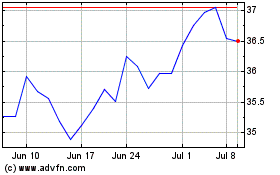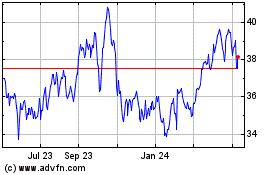BP Ramps Up Deal Making -- WSJ
December 20 2016 - 3:02AM
Dow Jones News
Firm's agreement with Kosmos Energy follows all-share pact for
stake in U.A.E. fields
By Sarah Kent and Bradley Olson
LONDON-- BP PLC has pulled off a string of deals in recent weeks
that signal the British oil giant is looking to grow again after
six years of retrenchment following the deadly Deepwater Horizon
disaster.
The latest evidence: A near $1 billion investment in a vast
natural gas field off the coast of Africa announced Monday. The
deal with Dallas-based Kosmos Energy Ltd. followed a $2.2 billion
all-share deal Saturday to take a 10% stake in a parcel of United
Arab Emirates oil fields.
Over the past month, BP also has bought a stake in the
supergiant Zohr gas field offshore Egypt and expanded its interest
in Indonesia's Tangguh natural-gas project. It has bought in to two
exploration blocks in the North Sea and approved a $9 billion oil
project in the Gulf of Mexico.
BP's executives highlighted the company's growth prospects this
year now that they have a handle on the financial toll of the 2010
Gulf of Mexico well blowout that killed 11 people, caused an
environmental disaster and forced the company to shrink
dramatically.
The company sold off around $50 billion in assets to help pay
for the cleanup and legal costs that ultimately totaled more than
$60 billion, only to be hit by a dramatic slump in oil prices that
took hold two years ago and compounded its financial woes. Its
daily production shrank to 3.3 million barrels of oil equivalent a
day in 2015, down from 4 million a day in 2009.
BP has moved ahead with the recent spate of deals now that the
Gulf spill costs are largely contained and the oil market is buoyed
by a production-cut deal struck last month by the Organization of
the Petroleum Exporting Countries.
"They are on the other side of the mountain now," said Fadel
Gheit, a managing director at Oppenheimer & Co. "They were in a
steep climb to survive. That is now behind them."
BP Chief Executive Bob Dudley said in July that the company was
prepared for "a new phase of growth" now that it had "drawn a line
under our Deepwater Horizon liabilities."
A BP spokesman said the deals were examples of its long-term
strategy "coming to fruition."
"It's all part of the strategy: getting bigger on gas, doing low
cost oil, deepening relationships and partnerships," the spokesman
said.
For the most part, BP's recent deals are relatively small
bolt-on acquisitions, but they show that companies are gradually
beginning to invest again after years of cutbacks and layoffs as
higher oil prices help return some confidence to the sector.
"Companies are now on a firmer financial footing after two years
of savage cuts, and they're able to look beyond survival and look
to how they start growing again," said Tom Ellacott, a senior
analyst at Edinburgh-based consultancy Wood Mackenzie. "The BP
deals are very good examples of this."
The agreement Monday with exploration company Kosmos Energy
calls for BP to pay more than $900 million in the coming years to
help test the viability of the Tortue prospect in waters off
Mauritania and Senegal. By some estimates, the field could hold as
much as 50 trillion cubic feet of natural gas. That is enough to
meet demand in the United Kingdom for about 20 years, according to
the U.S. Energy Information Administration.
The huge gas assets play into BP's strategy to invest more
heavily in the lower-carbon fossil fuel at a time when investors
and regulators are increasing their scrutiny of carbon emissions.
BP has said it expects around 60% of its production to be natural
gas by the end of the decade.
The deal also makes BP the operator of the project, giving the
British oil giant another potential growth opportunity in its
portfolio as two years of low energy prices and cost-cutting have
reduced the number of new drilling frontiers. Funding from BP will
be used for further drilling, as well as feasibility studies and
development costs that should put BP and Kosmos in a position to
make a final investment decision on the project by 2018, according
to Kosmos.
"The industry has taken a timeout over the last two years,
exploration has fallen off and many don't have the depth of
portfolio that they used to," Andrew Inglis, the chairman and chief
executive of Kosmos, said in an interview. "The big companies are
starting to address that issue."
In the U.A.E., BP has bought access to one of the last big oil
concessions available in the Middle East. The 40-year deal will
give BP access to 165,000 barrels of oil a day--a rich prize in
today's world, where many oil-rich countries in the Gulf are off
limits to big international oil companies. It ends a yearslong
standoff over terms that many within the industry criticized as
unattractive despite the volumes at stake.
Write to Sarah Kent at sarah.kent@wsj.com and Bradley Olson at
Bradley.Olson@wsj.com
(END) Dow Jones Newswires
December 20, 2016 02:47 ET (07:47 GMT)
Copyright (c) 2016 Dow Jones & Company, Inc.
BP (NYSE:BP)
Historical Stock Chart
From Mar 2024 to Apr 2024

BP (NYSE:BP)
Historical Stock Chart
From Apr 2023 to Apr 2024
